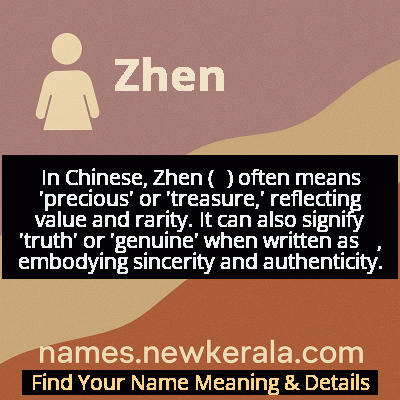Zhen Name Meaning & Details
Origin, Popularity, Numerology Analysis & Name Meaning of Zhen
Discover the origin, meaning, and cultural significance of the name ZHEN. Delve into its historical roots and explore the lasting impact it has had on communities and traditions.
Name
Zhen
Gender
Female
Origin
Chinese
Lucky Number
8
Meaning of the Name - Zhen
In Chinese, Zhen (珍) often means 'precious' or 'treasure,' reflecting value and rarity. It can also signify 'truth' or 'genuine' when written as 真, embodying sincerity and authenticity.
Zhen - Complete Numerology Analysis
Your Numerology Number
Based on Pythagorean Numerology System
Ruling Planet
Saturn
Positive Nature
Ambitious, efficient, realistic, and authoritative.
Negative Traits
Materialistic, stressed, confrontational, and can be overly ambitious.
Lucky Colours
Dark blue, black.
Lucky Days
Saturday.
Lucky Stones
Blue sapphire, amethyst.
Harmony Numbers
2, 4, 6.
Best Suited Professions
Business leaders, managers, financial services, law enforcement.
What People Like About You
Leadership, determination, organizational skills.
Famous People Named Zhen
Zhen Yi
Table Tennis Player
Olympic medalist and World Champion
Zhen Zidan
Actress
Starred in multiple award-winning historical dramas
Wang Zhen
Explorer
Led significant maritime expeditions during Ming Dynasty
Zhen Jiang
Scholar
Influential Confucian philosopher and poet
Name Variations & International Equivalents
Click on blue names to explore their detailed meanings. Gray names with will be available soon.
Cultural & Historical Significance
Extended Personality Analysis
Women named Zhen typically exhibit a remarkable blend of traditional virtues and modern capabilities that make them stand out in any setting. Their most defining characteristic is an unwavering authenticity - they possess a strong moral compass and refuse to compromise their principles for convenience or social approval. This genuineness makes them incredibly trustworthy and reliable, often serving as the moral anchor in their families and workplaces. Zhen personalities tend to be deeply observant and thoughtful, preferring to listen and analyze before speaking, which gives them exceptional judgment in complex situations. They approach life with the patience of a master craftsperson, understanding that true value develops gradually through consistent effort and reflection. While they may appear reserved to casual acquaintances, those who know them well appreciate their dry wit, surprising creativity, and fierce loyalty. Their strength lies in emotional resilience - like the jade their name references, they can withstand pressure without breaking, emerging from challenges with greater wisdom and character. In professional settings, they excel in roles requiring integrity, attention to detail, and long-term vision, often becoming respected leaders who inspire through example rather than authority.
Modern Usage & Popularity
In contemporary naming practices, Zhen maintains strong cultural relevance while adapting to modern sensibilities. The name enjoys consistent popularity among Chinese families who value traditional virtues but seek names with elegant simplicity. Recent data from China's Ministry of Public Security shows Zhen ranking in the top 200 female names nationwide, with particularly strong representation in culturally conservative regions and among urban professionals. The name has gained additional appeal through positive media representations, most notably in the massively popular television drama 'Empresses in the Palace,' whose protagonist Zhen Huan embodies intelligence and moral strength. Internationally, Zhen has become a favored choice among diaspora communities seeking to preserve cultural identity while ensuring pronounceability in multicultural environments. Social media analysis reveals that women named Zhen are disproportionately represented in education, cultural preservation, healthcare, and sustainable business sectors - fields where authenticity and trustworthiness are paramount. The name's usage has also inspired creative variations and combinations, such as double-character names like Zhenyu (珍瑜, 'precious jade') or Zhenxi (珍熙, 'precious brightness'), demonstrating its ongoing evolution within modern Chinese naming conventions.
Symbolic & Spiritual Meanings
The symbolic resonance of Zhen extends far beyond its literal translation, encompassing philosophical depth and cultural metaphor. In Confucian thought, Zhen represents the ideal of 'zhenshi' (真实) - truthfulness and reality as opposed to superficial appearance. This connects to the concept of self-cultivation, where individuals must polish their character like jade to reveal its inherent beauty. Taoist philosophy interprets Zhen as representing the original, uncorrupted state of being - what Laozi called 'returning to the root' in the Dao De Jing. The character's association with jade links it to traditional Chinese values where jade symbolizes the perfect integration of beauty and utility, softness and strength. In Chinese alchemy and medicine, 'zhen' denotes purity and essential quality, as in 'zhenqi' (genuine energy) that sustains life. Symbolically, the name evokes the image of a hidden treasure that reveals its value gradually, requiring patience and discernment to appreciate fully. It also carries associations with the mythical fenghuang (phoenix), which represents high virtue and grace under pressure. In modern contexts, Zhen symbolizes resistance to artificiality and commercialism, representing the enduring value of authenticity in a rapidly changing world.

